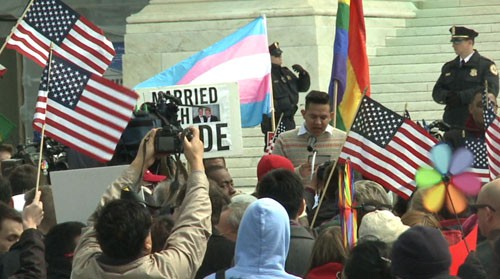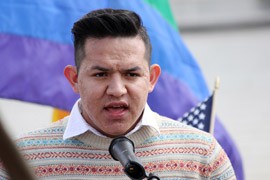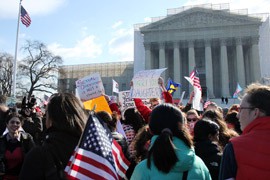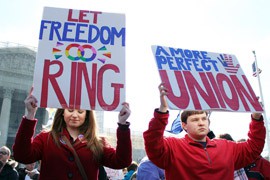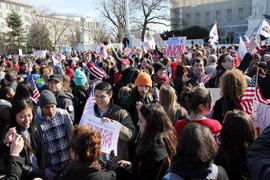Cronkite News has moved to a new home at cronkitenews.azpbs.org. Use this site to search archives from 2011 to May 2015. You can search the new site for current stories.
Crowds thin, emotions still high on second day of hearings on gay marriage
WASHINGTON – Jerssay Arredondo said life as an illegal immigrant and a gay man can be a “double struggle” – which was all the more reason for him to be on hand as the Supreme Court heard arguments on same-sex marriage.
“We must remember that immigrant rights are (gay) rights” and vice versa, the 21-year-old Phoenix resident said Wednesday on the steps of the Supreme Court.
Arredondo was one of hundreds of same-sex marriage supporters who gathered as the court heard arguments on the Defense of Marriage Act, a 1996 federal law that defines marriage as being between a man and a woman.
It was the second of two days of historic hearings by the court, which on Tuesday considered a challenge to California’s Proposition 8, which defines marriage in that state as one-man, one-woman.
Crowds were down significantly from Tuesday when thousands turned out, with roughly equal numbers of same-sex opponents and supporters at the height of the rallies.
But Wednesday’s crowds still filled the foot of the Supreme Court’s steps, where they waved flags, chanted and held up signs for their cause.
While supporters were well-represented Wednesday, the number of opponents had dropped off sharply from the day before. Gone were the competing chants and cheers that dominated parts of the day Tuesday.
Protesters from the Westboro Baptist Church – which has made a name with high-profile, shocking anti-gay demonstrations – were on hand singing and yelling Wednesday. But they left mid-morning.
Other opponents were quieter.
DOMA supporter Jim McDonald held a sign that read “Civil Unions Yes, Marriages No.” He said he does not have a problem with gay partners getting the equivalent of spousal benefits, but does not think they should be allowed to marry.
Noting that “gay” has gone from meaning happy or joyous to referring to homosexuality, McDonald said he does not want to see the word “marriage” change in meaning, too. He would rather see same-sex couples use the term “civil union.”
“This day is about the definition of what marriage is,” said McDonald, a lawyer from nearby Alexandria, Va. “Language is important. Words are important to me.”
James Manship came to protest same-sex marriage dressed in Revolutionary War garb and holding a flag. He said same-sex marriage is unconstitutional, pointing to the preamble of the Constitution, which cites the need to “secure the blessings of liberty to ourselves and our posterity.”
Manship said that because same-sex couples are unable to have children, allowing them to marry is detrimental to the country’s posterity.
The former Navy cryptologist called marriage “the basic unit that defines society” and said the Supreme Court should not “take a position of arrogance and redefine a word.”
But Arredondo, who was one of about a dozen people, from reverends to representatives, to speak at the rally, the fight over DOMA is still only the beginning of the fight for marriage equality.
For Arredondo, who was brought to the United States from Mexico at age 3, it’s also part of a larger fight. He is a member of Queer Undocumented Immigrant Project and he comes to Washington to advocate for the approximately 250,000 illegal immigrant adults who he says identify as gay.
He says those groups – illegal immigrants and gays – need to support each other as the Supreme Court debates gay marriage and Congress considers comprehensive immigration reform.
“It is very important that DOMA is overturned because it is a fundamental principal of equality that marriage is for everyone,” Arredondo said.

